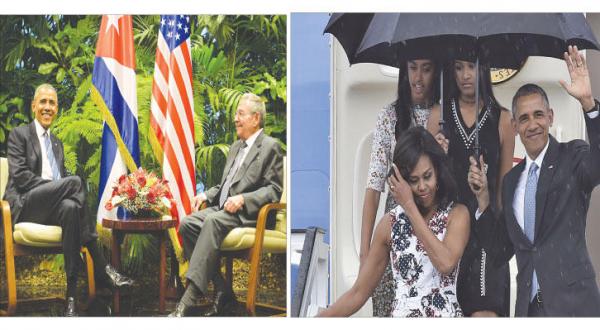
US President Barack Obama with the First Lady Michelle Obama and their two daughters when arriving to Havana on Sunday
Havana- US President Barack Obama arrived in Cuba on Sunday on a trip that comes 15 months after he and Raúl Castro agreed to end five decades of Cold War-era enmity and work to normalize relations.
On the first full day of his visit, he went to the heart of Cuba’s Communist system, Revolution Square at the memorial to independence hero Jose Marti.
He moved on to the nearby Palace of the Revolution, where Castro and his predecessor, older brother Fidel Castro, have led Cuba’s resistance to US pressure going back decades.
A US first presidential visit to the inner palace of Cuban power in 88 years was followed by Obama and Raúl Castro’s rapprochement in December 2014.
Obama and Castro have met three times before, but Monday’s meeting was set to be the most substantial. The two leaders have deep differences to discuss as they attempt to rebuild the bilateral relationship.
Obama arrived by Air Force One in Havana on Sunday, yet Castro did not meet the plane and there were no military honors.
Cuban police backed by hundreds of shouting pro-government demonstrators broke up a “Ladies in White” march on Sunday, detaining dozens of people just hours before Obama landed.
Castro said the two countries have “profound differences that will not disappear overnight; such as our political system, democracy, the exercise of human rights, social justice, international relations, and world peace and stability.”
Moreover, following the meeting between Obama and Castro, President Obama said in an exclusive interview with ABC News that he believed the Cuban leader “truly” wanted change in the island nation and that Cuba would become “more prosperous” in the future.
“For 50 years, they have used American aggression or interests in regime change as the excuse for why they had to guard against dissent inside of Cuba. … As normalization occurs, that excuse is taken away,” Obama said. “What I indicated to him is that we can’t force changes on Cuba — but what we can do and will continue to do is to stand up to the rights that we consider to be universal.”
He also said the United States respected Cuba’s sovereignty. “The future of Cuba will be decided by Cubans and not by anyone else,” Obama said.
